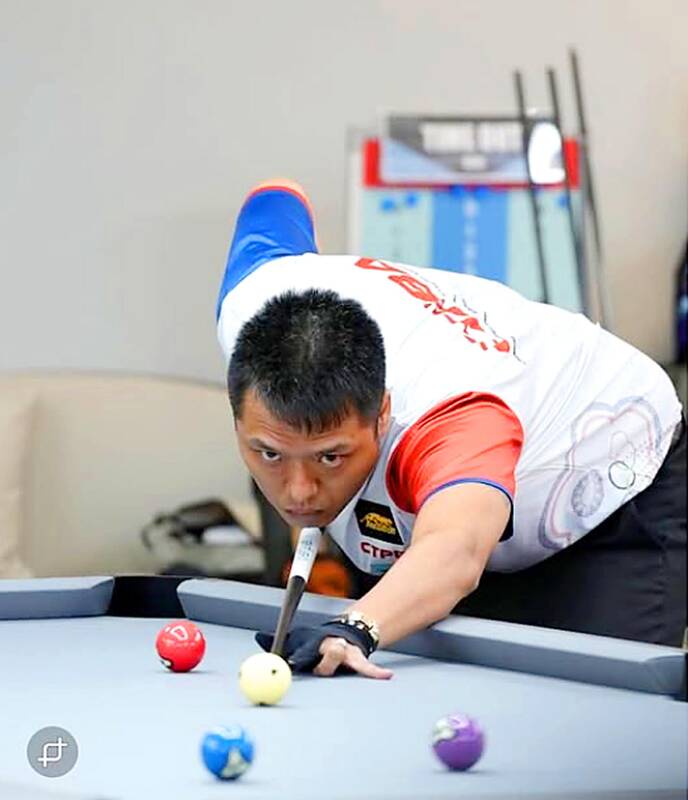Taiwanese billiards champion Chang Jung-lin (張榮麟) died in Jakarta on Monday, national billiards association president Chao Fong-pong (趙豐邦) said.
He was 40.
Chao confirmed Chang’s death in an interview with the Central News Agency, describing it as “really too sudden.”

Photo: Screen grab from Chang Jung-lin’s Facebook page
Chang, who was known in Taiwan by his nickname “Devil Fire Cloud” (火雲邪神), had competed in a match earlier that morning and returned to his hotel to rest after feeling unwell, Chao said.
He was found in his hotel room without a pulse and not breathing, and was taken to a hospital, but could not be revived, he said.
He described Chang as “among the best in Taiwan,” winning many international championships.
Chang had been scheduled to represent Taiwan at the World Games in China next month, Chao said.
Chang rose to fame in 2003 after winning silver at the World Junior Championships.
He reached the world No. 1 ranking in 2012 after winning the World Pool Billiard Association’s World Eight-ball Championship and was considered one of Taiwan’s most recognized figures in the sport.
Following the news of his death, the national billiards association posted a tribute on social media.
“Thank you for your years of hard work for billiards and bringing honor to the country,” the association said.

Chinese spouse and influencer Guan Guan’s (關關) residency permit has been revoked for repeatedly posting pro-China videos that threaten national security, the National Immigration Agency confirmed today. Guan Guan has said many controversial statements in her videos posted to Douyin (抖音), including “the red flag will soon be painted all over Taiwan” and “Taiwan is an inseparable part of China,” and expressing hope for expedited reunification. The agency last year received multiple reports alleging that Guan Guan had advocated for armed reunification. After verifying the reports, the agency last month issued a notice requiring her to appear and explain her actions. Guan

GIVE AND TAKE: Blood demand continues to rise each year, while fewer young donors are available due to the nation’s falling birthrate, a doctor said Blood donors can redeem points earned from donations to obtain limited edition Formosan black bear travel mugs, the Kaohsiung Blood Center said yesterday, as it announced a goal of stocking 20,000 units of blood prior to the Lunar New Year. The last month of the lunar year is National Blood Donation Month, when local centers seek to stockpile blood for use during the Lunar New Year holiday. The blood demand in southern Taiwan — including Tainan and Kaohsiung, as well as Chiayi, Pingtung, Penghu and Taitung counties — is about 2,000 units per day, the center said. The donation campaign aims to boost

The Kaohsiung Tourism Bureau audited six hotels in an effort to prevent price gouging ahead of Korean band BTS’ concert tour in the city scheduled for Nov. 19, 21 and 22 this year. The bureau on Friday said that the audits — conducted in response to allegations of unfair pricing posted on social media — found no wrongdoing. These establishments included the local branches of Chateau de Chine, Hotel Nikko, My Humble House, and Grand Hai Lai, it said, adding that the Consumer Protection Commission would have penalized price gougers had the accusations been substantiated. The bureau said the Tourism Development Act

BACK TO WINTER: A strong continental cold air mass would move south on Tuesday next week, bringing colder temperatures to northern and central Taiwan A tropical depression east of the Philippines could soon be upgraded to be the first tropical storm of this year, the Central Weather Administration (CWA) said yesterday, adding that the next cold air mass is forecast to arrive on Monday next week. CWA forecaster Cheng Jie-ren (鄭傑仁) said the first tropical depression of this year is over waters east of the Philippines, about 1,867km southeast of Oluanpi (鵝鑾鼻), and could strengthen into Tropical Storm Nokaen by early today. The system is moving slowly from northwest to north, and is expected to remain east of the Philippines with little chance of affecting Taiwan,